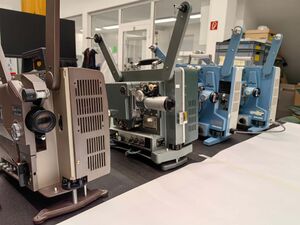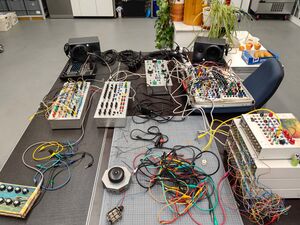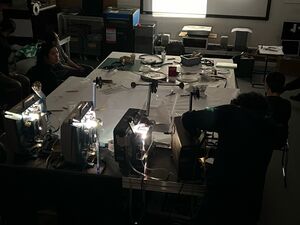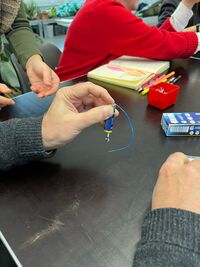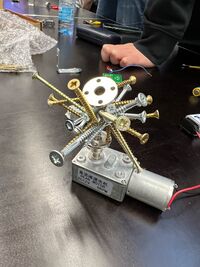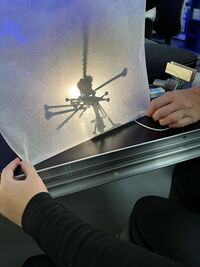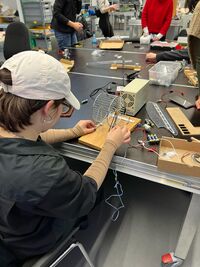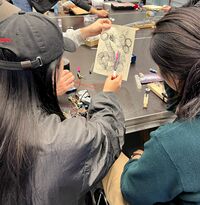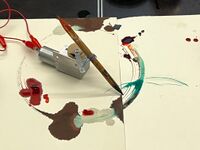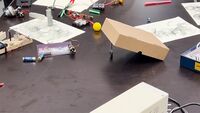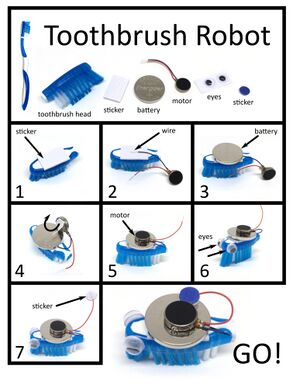Klang-Bild-Maschinen
Aus exmediawiki
Version vom 20. Mai 2024, 21:40 Uhr von Karin (Diskussion | Beiträge) (→eigene seiten/ your own pages)
Klang-Bild-Maschinen, WS 23-24 Wednesday, 14:00-16:00, different spaces
Inhaltsverzeichnis
# 25.10.23
Workshop Floris Vanhoof
- -
- -
# 01.11.23
no seminar today
#08.11.23
first introductions and some examples
- George Clouzot, INFERNO, 1964
- Edwin Welte, Lichttonorgel, 1930er, Tonscheibe,

- Edwin Welte, more about the Welte Licht-Ton-Orgel or Phototone Organ
- Edwin Welte, patents for Welte Licht-Ton-Orgel
- Pixivisor (Alexander Zolotov) is a tool for experimenting with the transmission of video over audio.
- Margaret Watts Huges, The Eidophone, 1904
- Tonoscope, Eidoscope
- Jens Brand, Red Psi Donkey, audiovisual installation, 2008
- Jens Brand used an acoustic camera, see here. Example of applications eg in bioacoustics
- Peter Fischli and David Weiss, the way things go, 1987
- Marcel Duchamp (with help by Man Ray), Rotary Glass Plates (Precision Optics), formerly titled as Revolving Glass Machine, 1920
- Marcel Duchamp, rotary demisphere, 1925 (2dimensional discs)
- Marcel Duchamp, Rotoreliefs (Optical Disks) 1935, published 1953. Plates set on a turntable
- Marcel Duchamp, Anémic cinéma, 1926, playing with sound of words engraved on the discs and rotating discs sensations
- Mariska de Groot, dutch multimedia artist. She will be performing at soundings on January 11, 2024 main page
- Mariska de Groot, stirred mandala II, 2019
tbc
where: animation studio
#15.11.23
no seminar today
#22.11.23
where: exMedia Lab
#29.11.23
workshop
with guest Darya Gulyamova
where: exMedia Lab
next day (30.11.) soundings with Darya Gulyamova
#06.12.23
experiments with
screens
lights
shadows
movements
where: animation studio
#13.12.23
due to general assembly no seminar today
#20.12.23
more experiments with
arduino
screens
lights
shadows
movements
where: animation studio
#10.01.24
guest Mariska de Groot
presenting a initiative she co-initiated: instrument inventors initiative
showing some examples of how she approaches her works and connections between sound, image, installation.
looking at some history of the workings of drawings on film etc in the background
- Norman McLaren Synchromy
- Lev Theremin Rhythmicon (1931)
- Eugeny Sholp Variophone 1931
- Murzin a.n.s. synthesizer (1937-57), coil - a.n.s. synthesizer
- Daphne Oram oramics, drawing sound
- also take a look at the book sound in z, Andrew Smirnov (also in the khm-library)
talking about her works and different stages in her work: see her website
material patterns: patterns of light: patterns in sound, rhythm
eg about her harmonograph inspired work nibiru - planet of crossing
where: exMedia Lab
next day (11.01.) soundings: Mariska de Groot
#17.01.24
everyone playing with Majas code for art's birthday:
three more gifts for art's birthday:
a hand-moved-butterfly-machine by Claude, two furry gloves by Kyuwon, a magnetic-resonance-nail lacquer-sound-picture by Sayaka.
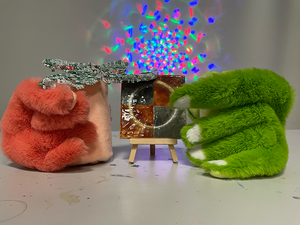
#24.01.24
last seminar day
discussing concepts/ ideas/ sketches of klangbildmaschinen.
AND
building and experimenting with brush bots
just two of many examples:
and a study about vibration-driven robots:
Modeling, Analysis, Control and Design of the Brushbot on arXiv.
where: exMedia Lab
eigene seiten/ your own pages
| Janosch | [[ | ]] | Claude | [[ | ]] | [[ | ]] |
| [[ | ]] | [[ | ]] | visible unicorn |
how to work with subpages
seminar text vv
Was geschieht mit Formen, wenn sie in Bewegung versetzt werden? Wie werden Räume durch bewegte Objekte geschaffen und verändert? Welche Klänge entstehen beim Bewegen der Objekte oder umgekehrt können diese Objekte erst in Bewegung versetzen? Was für Athmosphären entstehen dabei und welche Geschichten werden davon erzählt? Was hält diese kleinen klingenden-leuchtenden Universen zusammen?
Im Seminar wollen wir entlang dieser Fragen Klang-Bild-Maschinen erdenken, entwerfen und realisieren, wobei wir uns auf Aspekte der gemeinsamen Gestaltung von Klängen und Licht in Bewegung konzentrieren.
Dabei möchten wir uns an dem Begriff "expanded cinema" orientieren. Seit den 1970er Jahren verweist "expanded cinema" auf die künstlerisch-forschende Suche nach Möglichkeiten zur Erweiterung etablierter kinematografischer Standards. Dabei geht es in erster Linie um das prozesshafte Experimentieren entlang einer "expanded consciousness". (Siehe dazu: Sheldon Renan "The Underground Film" (1967) und Gene Youngblood "Expanded Cinema" (1970), sowie auch Alvin Toffler "Future Shock" (1970).
